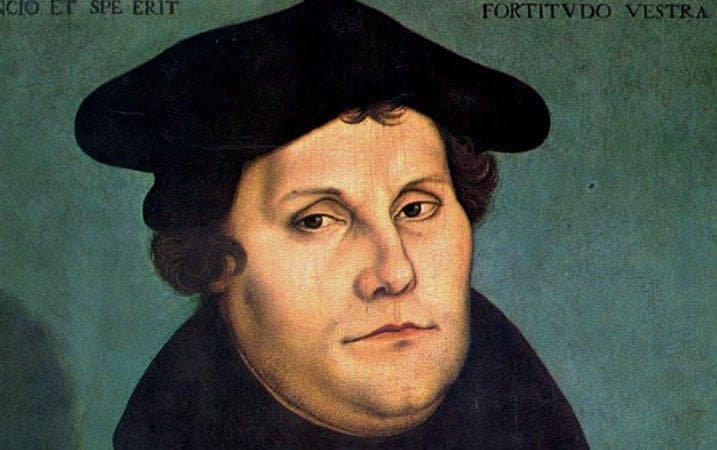Almost 500 years ago, on Oct. 31, 1517, German monk Martin Luther strode up to the door of All Saints Church in Wittenberg and nailed his 95 Theses for debate. He was attacking widespread abuses in the Catholic Church: Simony, nepotism, usury, pluralism, and the sale of indulgences.
The anniversary celebrations have already begun. In his homily at the close of the week of prayer for Christian unity, Pope Francis echoed Pope St John Paul II’s famous Ash Wednesday Jubilee apology and acknowledged the sins of Catholics against other Christians. He also told Catholics to forgive the wrongs done to them. The pope said injuries that had happened in the past can’t be canceled, but the burden of old wounds should not continue to harm the relations between Catholics and other Christians.
Pope Francis has built bridges with Protestants in remarkable ways. His personal friendship with the late Anglican-style bishop Tony Palmer, and his video greeting to American pentecostal preachers followed by a personal meeting, raised eyebrows among many Catholics and raised a cry of dismay among the most vocal of conservative Catholics.
Pope Francis’ outreach to Protestants will go to new lengths when he travels to Lund in Sweden in October to attend a service marking the 500th anniversary of the start of the Protestant Reformation.
Is this something to celebrate?
Francis critics would say the Reformation is something to be lamented, not celebrated. They observe that the Protestant Reformation not only shredded Catholic Christianity; it also plunged the body of Christian believers into endless schism, resulting in thousands of Protestant sects. The Reformation led to decades of war, revolution, and endless division and strife in Europe. Was it worth it? Instead of celebrating, shouldn’t the pope be inviting Protestants to repent of their rebellion and “come home to Rome”?
Perhaps. Then again, he could be realistic and positive. The Catechism says that those Christians born into ecclesial bodies that are separated from Rome are not to be blamed for the division. The successor of Peter is the focus of unity not just for Catholics, but for the whole church. As such, it is his obligation to reach out to all Christians who are separated from full communion with the warm welcome of a father. We saw this remarkable welcome in the papacies of Pope St. John Paul II and Benedict XVI. Time and again, they reached out in their own way to Eastern Orthodox, Anglicans, Lutherans, Pentecostals, Baptists, and others. Pope Francis is simply following in their footsteps.
Critics of Pope Francis’ celebration of the Reformation would do well to ignore sensationalist headlines and discover exactly what is planned for the service in Lund in October.
Rev. Dr. Martin Junge, the general secretary of the Lutheran World Federation explains that the federation is approaching the anniversary “in a spirit of ecumenical accountability,” while Cardinal Kurt Koch, president of the Pontifical Council for Promoting Christian Unity, points out that the event is not so much a celebration as a commemoration focused on the path to unity.
“By concentrating together on the centrality of the question of God and on a Christocentric approach,” he said, “Lutherans and Catholics will have the possibility of an ecumenical commemoration of the Reformation, not simply in a pragmatic way, but in the deep sense of faith in the crucified and resurrected Christ.”
Archbishop Antje Jackelén of the Church of Sweden has said, “We shall pray together with the entire ecumenical family in Sweden that the commemoration will contribute to Christian unity in our country and throughout the world.” His Catholic opposite number, Anders Arborelius OCD, bishop of the Catholic Church in Sweden, has said, “The ecumenical situation in our part of the world is unique and interesting. I hope that this meeting will help us look to the future so that we can be witnesses of Jesus Christ and His gospel in our secularized world.”
The event in Lund, therefore, is not the “celebration of the Reformation.” It is part of the ongoing conversation with Lutherans. The Lund event is also part of the reception process of the study document “From Conflict to Communion,” which was published in 2013. This Lutheran-Catholic study analyzes the history and results of the Reformation. This follows the historic “Joint Declaration on the Doctrine of Justification,” signed by Catholics and Lutherans in 1999 and seen as a groundbreaking document for further discussions with other Christians from the Reformation traditions. The World Methodist Council signed it in 2006, and it was this document on justification that so excited the pope’s friend Tony Palmer, prompting him to encourage other Evangelical Protestants to see the Reformation as being over.
In commemorating the Reformation, we should be honest and realistic. The Protestant Reformation shattered Western Christendom and led to war, schism, division, heresy, and strife. But if we are honest, we should also consider the contributions the churches of the Reformation have made to world Christianity over the past 500 years, the greatest of which was the renewal of the Catholic Church known as the Counter Reformation. It was, arguably, only because of the reformers’ critiques of the Catholic Church that the great wave of 16th- and 17th-century renewal and missionary work could have taken place.
The commemoration of the beginning of the Protestant Reformation is an opportunity to ponder how God works through our human failures, brokenness, and rebellion to bring about an even greater glory in his purpose. It is also a chance to take one step further in the long, hard road to unity in Christ’s body.















